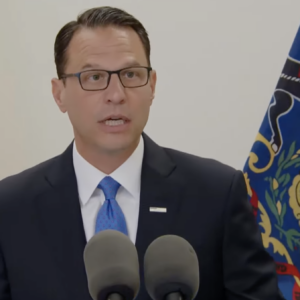When Democratic Pennsylvania Gov. Josh Shapiro signed a $47.6 billion budget this summer, he promised it was “cutting costs and reducing taxes” for residents.
Months later, he received a ‘D’ grade from the libertarian Cato Institute in its Fiscal Policy Report Card on America’s Governors. Six Republican governors received A grades while six Democrat governors – including Tim Walz of Minnesota, the party’s vice-presidential nominee – received F grades.
Scholars at the Washington, DC-based think tank took umbrage at Gov. Shapiro’s claim about not raising taxes.
“That is not entirely correct as he proposed a new tax on electronic gaming machines to raise $150 million a year. He also called for legalizing recreational marijuana and imposing a 20 percent tax on the wholesale price, which would raise about $200 million a year,” wrote Cato analysts.
Those plans did not become law.
They also found multiple faults with Shapiro’s spending plans, specifically the failed Pennsylvania Climate Emissions Reduction Act (PACER).
Shapiro claimed PACER was a plan “tailored for Pennsylvania” and necessary for the future. He suggested it would result in lower prices on utilities, reduce carbon emissions, and create 14,500 jobs.
Cato scholars, however, called PACER a tax hike because it would have capped carbon emissions and used “about three-quarters of the money raised to recycle back to electricity consumers in a progressive manner, with the rest spent on green energy programs.”
Energy advocates and Pennsylvania Republicans long called the PACER proposal a tax on consumers. They argued any plan to raise carbon prices would cause prices on other products to also rise. They said those prices would then be passed along to residential and business consumers.
The Pennsylvania legislature didn’t pass the PACER plan, nor were any hearings held on it.
Shapiro also received criticism for backing budget hikes and wanting to use surpluses to increase spending. Pennsylvania’s budget grew 9 percent this year and could increase 8 percent in 2025.
The Pennsylvania Independent Fiscal Office warned over the summer that the state’s budget surplus would be wiped out due to the Shapiro-led spending spree.
Nathan Benefield with the Commonwealth Foundation wasn’t surprised by Cato’s grade for Shapiro. He told DVJournal the increased spending will eventually lead to tax hikes for Pennsylvania families.
“If Shapiro wants to be taken seriously as a fiscally responsible governor, he needs to control spending and keep his promises to provide tax relief,” said Benefield.
It wasn’t all doom and gloom for the governor’s work.
Cato praised Shapiro for eschewing a severance tax on energy companies – despite pressure from House Democrats. He was also credited for a proposal to exempt cell phone bills from certain taxes that would have saved taxpayers $124 million a year.
He also received praise for signing the 2023 budget that included an increased childcare tax credit and credits for donors to private school scholarships.
The Shapiro administration did not return a request for comment.
Please follow DVJournal on social media: X@DVJournal or Facebook.com/DelawareValleyJournal

